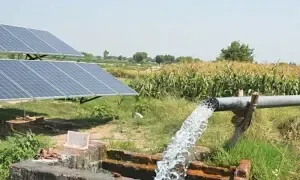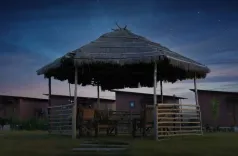Why Are Farmers on Hunger Strike in Quetta?

Synopsis
Key Takeaways
- Kissan Ittehad Pakistan is on a hunger strike for agricultural support.
- The strike highlights the urgent need for government intervention.
- Farmers face critical issues due to power supply disruptions.
- Failure to meet demands could escalate the protest.
- Restoration of agricultural support is vital for local communities.
Islamabad, Sep 2 (NationPress) Members of Kissan Ittehad Pakistan (KIP) are currently on a hunger strike in front of the Quetta Press Club demanding that the Balochistan government comply with their 15-point charter of demands, as reported by local media on Tuesday.
During a recent press briefing, KIP chairman Khalid Hussain Bathh stated that the hunger strike will persist until their demands, which address the concerns of growers and landowners affected since 2022, are accepted and implemented. He expressed disappointment over the government's failure to take action on their issues despite numerous appeals.
Bathh reiterated, "We are once again submitting our 15-point charter of demands." He announced the establishment of a hunger strike camp outside the press club and cautioned that this initial token hunger strike could escalate to a full-scale hunger strike if the authorities fail to address their grievances.
The KIP Chairman criticized the Balochistan government for not delivering promised solar energy systems to growers and landowners, noting that the Quetta Electric Supply Company has been disconnecting their power connections. He urged the government to allocate funds for the solarization of agricultural tubewells and called for the restoration of Rabi canal tubewell connections in Manjoshori, Nasirabad, and the reinstatement of power supply in Harnai and Kuchlak.
On August 16, KIP chairman Khalid Hussain Bathh had previously criticized the Balochistan government for failing to provide funds for farmers in the Nasirabad Division, the province's only green belt, to convert their agricultural tube wells to solar energy, despite prior commitments.
In that press conference, he indicated that tube wells have become non-operational, crops are wilting, and farmers are incurring significant financial losses due to power supply disruptions, as reported by Dawn. He pointed out that while authorities had pledged funds for solarization, these funds have yet to be disbursed.
Electricity connections were cut, and supplies were downgraded from three-phase to two-phase before payments were processed. He emphasized that tube wells are inoperative, no water is flowing in the Rabi Canal, and agriculture, livestock, and local communities are severely affected by power supply interruptions.
The KIP Chairman noted that crops have perished due to the lack of irrigation water, and there is even a scarcity of drinking water. Following assurances from the Balochistan Irrigation Minister, farmers had planted crops; however, the seeds were ruined because of the water shortage.








